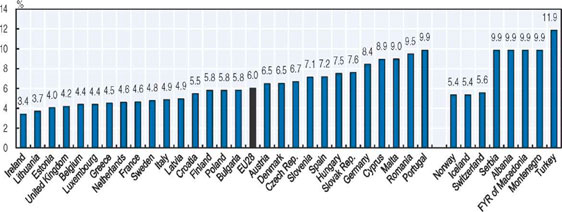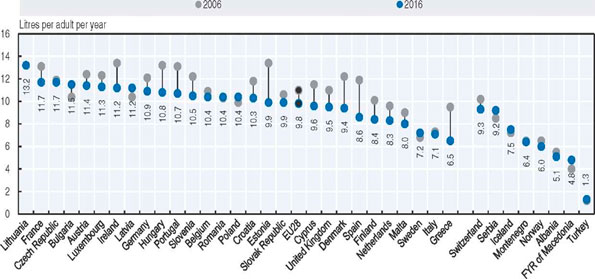|

|
HEALTH AT A GLANCE: EUROPE 2018
STATE OF HEALTH IN THE EU CYCLE
OECD Publishing, 2018, 216 pages
|
https://www.oecd-ilibrary.org/docserver/health_glance_eur-2018-en.pdf?expires=1543943181&id=id&accname=guest&checksum=207EE2EA6D8CB77164BD1205ABCF7C93
|

Note: All cancers are included except non-melanoma
skin cancer. Numbers are age-standardised based on the European
Standard Population.
Расчетный уровень заболеваемости по всем видам
рака по странам, 2018 г. (стр. 105)

Note: Age-standardised prevalence of population
aged 18-99 with Type 1 or Type 2 diagnosed diabetes.
Доля взрослых с диабетом, 2017 г. (стр. 107)

Общее потребление алкоголя среди взрослых, 2006
и 2016 годы (или ближайшие годы) в литрах чистого алкоголя
(стр.119)
|
В пятом издании обзора состояния здоровья в Европе в
цифрах представлены набор ключевых показателей по состоянию здоровья
населения, детерминантах здоровья, ресурсах и деятельности в области
здравоохранения, качеству медицинского обслуживания, расходах на
здравоохранение и финансирование в 35 европейских странах, в том
числе 27 странах-членах Европейского союза, 5 странах-кандидатах
и 3 странах Европейской ассоциации свободной торговли. Выбор показателей
в значительной степени основан на кратком списке индикаторов состояния
здоровья Европейского сообщества (ECHI) - наборе показателей, который
был разработан для составления отчетности по статистике здравоохранения
в Европейском союзе. Он дополнен показателями расходов на здравоохранение
и качества медицинской помощи, основанными на опыте ОЭСР в этих
областях. Каждый индикатор представлен в удобном для пользователя
формате, состоящем из диаграмм, иллюстрирующих различия между странами
и с течением времени, краткого описательного анализа, освещающего
основные выводы, представленные данными, и методологической вставкой
с определением показателя и любых ограничений в данных сопоставимость.
Публикация состоит из двух частей. Часть I состоит из
двух тематических глав, первая из которых посвящена необходимости
согласованных усилий по улучшению психического здоровья, а вторая
посвящена возможным стратегиям сокращения расточительных расходов
на здравоохранение. В части II представлены самые последние тенденции
в ключевых показателях состояния здоровья, факторов риска и расходов
на здравоохранение, а также обсуждение прогресса в повышении эффективности,
доступности и устойчивости европейских систем здравоохранения.
Table of contents
Executive summary
Readers' guide
Part I
Thematic chapters on public health and health care issues
Chapter 1. Promoting mental health in Europe: Why and
how?
Introduction
Mental illness affects tens of millions of Europeans every year
The costs of mental health problems exceed 4% of GDP
Actions to promote mental health and prevent mental illness in
Europe
Conclusions
Note
References
Chapter 2. Strategies to reduce wasteful spending: Turning
the lens to hospitals and pharmaceuticals
Introduction
Addressing wasteful spending in hospitals
Addressing wasteful spending on pharmaceuticals
Conclusions
Notes
References
Part II
Overview of health indicators
Chapter 3. Health status
Trends in life expectancy
Inequalities in life expectancy
Healthy life expectancy at birth and at age 65
Main causes of mortality
Mortality from circulatory diseases
Mortality from cancer
Mortality from respiratory diseases
Infant health
Self-reported health and disability
Notified cases of vaccine-preventable diseases
New reported cases of HIV and tuberculosis
Cancer incidence
Diabetes prevalence
Dementia prevalence
Chapter 4. Risk factors
Smoking among children
Smoking among adults
Alcohol consumption among children
Alcohol consumption among adults
Illicit drug consumption among children
Illicit drug consumption among adults
Obesity among children
Obesity among adults
Mortality due to air pollution and extreme weather conditions
Chapter 5. Health expenditure and financing
Health expenditure per capita
Health expenditure in relation to GDP
Health expenditure by type of good and service
Health expenditure in hospitals
Pharmaceutical expenditure
Financing of health expenditure
Chapter 6. Effectiveness: Quality of care and patient
experience
Avoidable mortality (preventable and amenable)
Childhood vaccinations
Patient experience with ambulatory care
Mortality following acute myocardial infarction (AMI)
Mortality following stroke
Waiting times for hip fracture surgery
Screening, survival and mortality for cervical cancer
Screening, survival and mortality for breast cancer
Survival and mortality for colorectal cancer
Late-diagnosed HIV and tuberculosis treatment outcomes
Healthcare-associated infections
Chapter 7. Accessibility: Affordability, availability
and use of services
Unmet health care needs
Financial burden of out-of-pocket expenditure
Population coverage for health care
Extent of health care coverage
Availability of doctors
Availability of nurses
Consultations with doctors
Availability and use of diagnostic technologies
Hospital beds and discharges
Waiting times for elective surgery
Chapter 8. Resilience: Innovation, efficiency and fiscal
sustainability
Adoption and use of Electronic Medical Records and ePrescribing
Individuals using the internet to access health services and health
information
Public health laboratory capacity to control infectious diseases
threats
Average length of stay in hospital
Day surgery
Capital expenditure in the health sector
Projections of public expenditure on health and long-term care
Statistical annex
|

